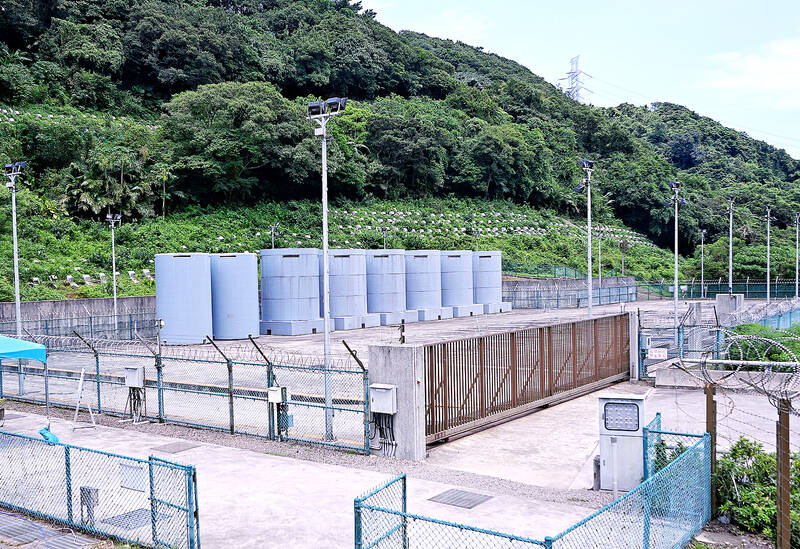Taiwan Power Co (Taipower, 台電) and the New Taipei City Government have struck a deal to allow the activation of the Jinshan Nuclear Power Plant’s spent fuel storage facility, ending an 11-year legal battle, the state-owned electricity company said yesterday.
The dry storage facility, which was designated to be used for the disposal of materials from the deactivated plant in the city’s Shihmen District (石門), could not be completed since the city government had not approved its water and soil conservation plans and delayed the completion date.
Last month’s earthquake in Hualien, which measured 7.2 on the Richter scale, has underscored the dangers of storing spent fuel in reactor cooling pools and the need to build dry storage facilities that can hold high-level radioactive waste, Taipower said in a news release.

Photo: Fang Pin-chao, Taipei Times
The company reached a mediated settlement with the city government on April 1 and submitted relevant documents on April 18 for approval, it said.
The improvements to the facility’s retaining walls and drainage systems would begin a month after the publication of the construction notice, Taipower said.
The improvements would be finished in three months and following that, the storage facility would be activated in four to six months, it said.
Plans for another dry storage facility for the Guosheng Nuclear Power Plant in New Taipei City’s Wanli District (萬里) are stuck in legal limbo, Taipower said.
Taipower hopes to achieve an agreement with the city government regarding the power plant, it added.
The Jinshan plant’s storage facility could not be used for storing the Guosheng plant’s spent fuel due to difficulties in transporting high-level radioactive waste and the legal problems that changing the stated purpose of the storage site might cause, Taipower said.
The most significant issue with nuclear energy is safety, and the city government took time during negotiations to ensure that no danger would stem from the facility’s proximity to river systems and the stability of the grounds, New Taipei City Deputy Mayor Liu Ho-jan (劉和然) said.
The city government hopes that Taipower would build the storage facility according to the specifications and furnish the water and soil conservation plan on time, Liu said.
Minister of Economic Affairs Wang Mei-hua (王美花) said that the ministry supports the negotiations.
For public safety reasons it necessary to ensure that spent fuel rods could be removed from the nuclear power plant, Wang said.
The ministry is mediating the dispute between Taipower and the New Taipei City Government over the proposed dry storage facility for the Guosheng Nuclear Power Plant, she said.
Taipower is not able to begin the construction of the nuclear waste depository due to the disagreement, Wang said.
The ministry hopes to resolve it soon, she added.

Taiwan has received more than US$70 million in royalties as of the end of last year from developing the F-16V jet as countries worldwide purchase or upgrade to this popular model, government and military officials said on Saturday. Taiwan funded the development of the F-16V jet and ended up the sole investor as other countries withdrew from the program. Now the F-16V is increasingly popular and countries must pay Taiwan a percentage in royalties when they purchase new F-16V aircraft or upgrade older F-16 models. The next five years are expected to be the peak for these royalties, with Taiwan potentially earning

STAY IN YOUR LANE: As the US and Israel attack Iran, the ministry has warned China not to overstep by including Taiwanese citizens in its evacuation orders The Ministry of Foreign Affairs (MOFA) yesterday rebuked a statement by China’s embassy in Israel that it would evacuate Taiwanese holders of Chinese travel documents from Israel amid the latter’s escalating conflict with Iran. Tensions have risen across the Middle East in the wake of US and Israeli airstrikes on Iran beginning Saturday. China subsequently issued an evacuation notice for its citizens. In a news release, the Chinese embassy in Israel said holders of “Taiwan compatriot permits (台胞證)” issued to Taiwanese nationals by Chinese authorities for travel to China — could register for evacuation to Egypt. In Taipei, the ministry yesterday said Taiwan

Taiwan is awaiting official notification from the US regarding the status of the Agreement on Reciprocal Trade (ART) after the US Supreme Court ruled US President Donald Trump's global tariffs unconstitutional. Speaking to reporters before a legislative hearing today, Premier Cho Jung-tai (卓榮泰) said that Taiwan's negotiation team remains focused on ensuring that the bilateral trade deal remains intact despite the legal challenge to Trump's tariff policy. "The US has pledged to notify its trade partners once the subsequent administrative and legal processes are finalized, and that certainly includes Taiwan," Cho said when asked about opposition parties’ doubts that the ART was

If China chose to invade Taiwan tomorrow, it would only have to sever three undersea fiber-optic cable clusters to cause a data blackout, Jason Hsu (許毓仁), a senior fellow at the Hudson Institute and former Chinese Nationalist Party (KMT) legislator, told a US security panel yesterday. In a Taiwan contingency, cable disruption would be one of the earliest preinvasion actions and the signal that escalation had begun, he said, adding that Taiwan’s current cable repair capabilities are insufficient. The US-China Economic and Security Review Commission (USCC) yesterday held a hearing on US-China Competition Under the Sea, with Hsu speaking on